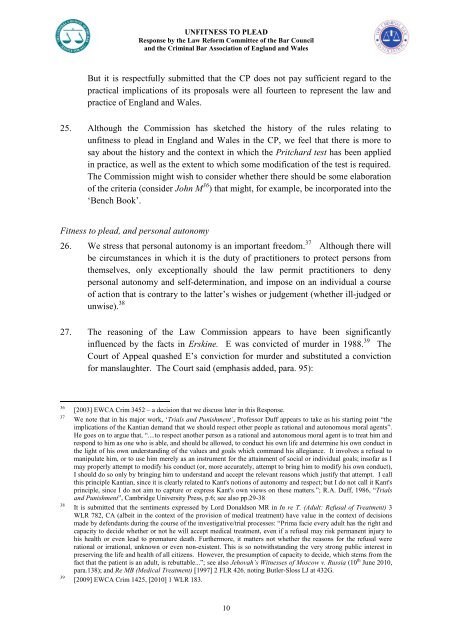Unfitness to Plead Consultation Responses - Law Commission ...
Unfitness to Plead Consultation Responses - Law Commission ...
Unfitness to Plead Consultation Responses - Law Commission ...
Create successful ePaper yourself
Turn your PDF publications into a flip-book with our unique Google optimized e-Paper software.
UNFITNESS TO PLEAD<br />
Response by the <strong>Law</strong> Reform Committee of the Bar Council<br />
and the Criminal Bar Association of England and Wales<br />
But it is respectfully submitted that the CP does not pay sufficient regard <strong>to</strong> the<br />
practical implications cations of its proposals were all fourteen <strong>to</strong> represent the law and<br />
practice of England and Wales.<br />
25. Although the <strong>Commission</strong> has sketched the his<strong>to</strong>ry of the rules relating <strong>to</strong><br />
unfitness <strong>to</strong> plead in England and Wales in the CP, we feel that there is more <strong>to</strong><br />
say about the his<strong>to</strong>ry and the context in which the Pritchard test has been applied<br />
in practice, as well as the extent <strong>to</strong> which some modification of the test is required<br />
The <strong>Commission</strong> might wish <strong>to</strong> consider whether there should be some elaboration<br />
of the criteria (consider John M<br />
‘Bench Book’.<br />
36 the his<strong>to</strong>ry of the rules relating <strong>to</strong><br />
, we feel that there is more <strong>to</strong><br />
has been applied<br />
is required.<br />
The <strong>Commission</strong> might wish <strong>to</strong> consider whether there should be some elaboration<br />
) that might, for example, be incorporated in<strong>to</strong> the<br />
Fitness <strong>to</strong> plead, and personal au<strong>to</strong>nomy<br />
26. We stress that personal au<strong>to</strong>nomy is an important freedom.<br />
be circumstances in which it is the duty of<br />
themselves, only exceptional<br />
personal au<strong>to</strong>nomy and self<br />
of action that is contrary <strong>to</strong><br />
37 Although there will<br />
be circumstances in which it is the duty of practitioners <strong>to</strong> protect persons from<br />
only exceptionally should the law permit practitioners <strong>to</strong> deny<br />
au<strong>to</strong>nomy and self-determination, determination, and impose on an individual a course<br />
contrary <strong>to</strong> the latter’s wishes or judgement (whether ill- -judged or<br />
unwise). 38<br />
27. The reasoning of the <strong>Law</strong> <strong>Commission</strong> appears <strong>to</strong> have been significantly<br />
influenced by the facts in Erskine. E was convicted of murder in 1988. Court of Appeal quashed E’s conviction for murder and substituted a convi<br />
for manslaughter. The Court said (emphasis added, para. 95):<br />
39 The<br />
Court of Appeal quashed E’s conviction for murder and substituted a conviction<br />
36<br />
[2003] EWCA Crim 3452 – a decision that we discuss later in this Response.<br />
37<br />
We note that in his major work, ‘Trials Trials and Punishment’<br />
Punishment’, , Professor Duff appears <strong>to</strong> take as his starting point “the<br />
implications of the Kantian demand that we should respect other people as rationa rational l and au<strong>to</strong>nomous moral agents”. agents”<br />
He goes on <strong>to</strong> argue that, “....<strong>to</strong> respect spect another person as a rational and au<strong>to</strong>nomous moral agent is <strong>to</strong> treat him and<br />
respond <strong>to</strong> him as one who is able, and should be allowed, <strong>to</strong> conduct his own life and determine his own conduct in<br />
the light of his own understanding of the values and goals which command his allegiance. It involves a refusal <strong>to</strong><br />
manipulate him, or <strong>to</strong> use him merely as an instrument for the attainment of social or individual goals; insofar as I<br />
may properly attempt <strong>to</strong> modify his conduct (or, more accurately, attempt <strong>to</strong> bring hhim<br />
im <strong>to</strong> modify his own conduct),<br />
I should do so only by bringing him <strong>to</strong> understand and accept the relevant reasons which justify that attempt. I call<br />
this principle Kantian, since it is clearly related <strong>to</strong> Kant's notions of au<strong>to</strong>nomy and respect; but I do not call it Kant's<br />
principle, since I do not aim <strong>to</strong> capture or express Kant's own views on these matters. matters.”; ”; R.A. Duff, 1986, “Trials “<br />
and Punishment”, ”, Cambridge University Press, p.6; see also pp.29 pp.29-38<br />
38<br />
It is submitted that the sentiments expressed by Lord DDonaldson<br />
MR in In re T. (Adult: Refusal of Treatment) 3<br />
WLR 782, CA (albeit in the context of the provision of medical treatment) have value in the context of decisions<br />
made by defendants during the course of the investigative/trial processes: “ “Prima facie every adult has the right and<br />
capacity <strong>to</strong> decide whether or not he will accept medical treatment, even if a refusal may risk permanent injury <strong>to</strong><br />
his health or even lead <strong>to</strong> premature death. Furthermore, it matters not whether the reasons for the refusal we were we<br />
rational or irrational, unknown or even non non-existent. existent. This is so notwithstanding the very strong public interest in<br />
preserving the life and health of all citizens. However, the presumption of capacity <strong>to</strong> decide, which stems from the<br />
fact that the patient nt is an adult, is rebuttable...”; see also Jehovah’s Witnesses of Moscow v. Russia (10 para.138); and Re MB (Medical Treatment) [1997] 2 FLR 426, noting Butler-Sloss LJ at 432G.<br />
39<br />
[2009] EWCA Crim 1425, [2010] 1 WLR 183.<br />
th June 2010,<br />
10

















